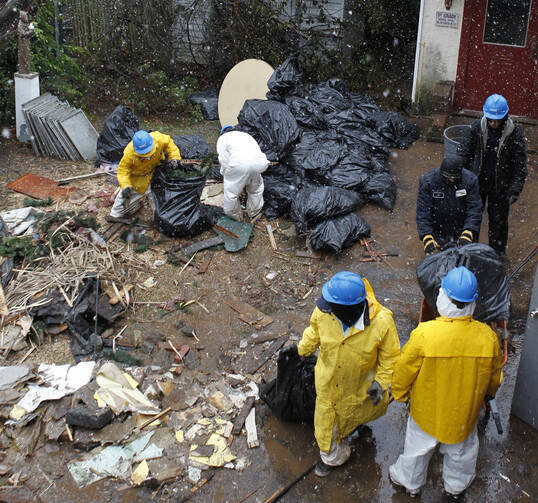Raising the Minimum
In his State of the Union address, President Obama made an important case for raising the federal minimum wage to $9 an hour. The last time Congress voted to raise the minimum wage was in 2007, when it authorized a graduated three-year increase. Since then the cost of living has increased significantly, mostly because of an escalation in fuel prices. The current rate of $7.25 is simply not high enough. Many people who earn the minimum wage have to work multiple jobs to pay the bills. Others must rely on public assistance to cover what they cannot afford. Many young people continue to live at home because their wages are not enough to pay rent.
Raising the minimum wage would make a difference in many lives. One student told The Huffington Post: “If the…minimum wage goes up, then I would either be able to make $200 more a month (which I could put toward loans or, better yet, actually start saving), or I could work about six or seven fewer hours a week, giving me more time to focus on my education.”
The president has also recommended pegging the minimum wage to inflation. This would be a major step forward. Because Congress must authorize every increase, the minimum wage has gradually fallen behind the cost of living. “The remuneration of work is not something that can be left to the laws of the marketplace; nor should it be a decision left to the will of the more powerful,” wrote Pope John XXIII.
Save the Vote
Testifying in 2006 on the reauthorization of the Voting Rights Act of 1965, the historian Alex Keyssar said the “right to vote can be as fragile as it is fundamental.” In the next several months its fragility may be tested.
Section 5 of the Voting Rights Act is directed specifically at 16 states or counties with a history of racial segregation; it requires those jurisdictions to submit changes in voting procedures to the federal government for approval. An Alabama county has challenged the law on the grounds that the law is no longer necessary, and the U.S. Supreme Court will hear the case on Feb. 27. Some of those who have benefited from the law’s protections see the litigation as an attempt to turn back the clock.
A second problem, mentioned by the president in his State of the Union Address, involves reports of voters waiting “five, six or seven hours to vote”—the “long lines” scandal. The Brennan Center for Justice has published recommendations for remedying the problem, which arises from a combination of partisan attempts to screen out illegal voters by means of elaborate identity checks and bad local management. The screening has a disproportionately adverse effect on eligible minority voters. The Brennan report calls for modernized digital registration, a computerized statewide voter database and 10 weekdays and two weekends of early voting as well as an increase in the number of polling places.
There are already at least seven voting reform bills before Congress waiting for attention. A newly appointed bipartisan presidential commission approaches its task with some of their homework already done by someone else. Now all must agree that democracy can flourish only if everyone can and will easily vote.
Hearing All Sides
Some notable voices have responded positively to the latest attempt by the Department of Health and Human Services to resolve a public policy dispute with the U.S. bishops and Catholic institutional employers. The department has dropped ill-advised qualifications for faith-based entities that would be eligible for an exemption from or an accommodation with a new mandate for cost-free contraception coverage in new health insurance plans.
In an initial statement Cardinal Timothy Dolan of New York, president of the U.S. Conference of Catholic Bishops, struck a conciliatory tone in the ongoing dispute, noting his desire to find “an acceptable solution…that respects the consciences of all.” After press reports described the U.S. bishops’ statement as a “rejection” of the administration’s overture, Cardinal Dolan took the unusual step of correcting the record, noting the intention of the bishops to study the proposed H.H.S. guidelines and to continue their dialogue with the Obama administration.
The Catholic Health Association described the revision as “substantial progress” and committed the association to further study of the proposed accommodation. And at least two bishops now contemplate a positive end to the dispute with the administration in statements that note points of convergence, the importance of dialogue on public policy matters and concerns about intemperate rhetoric. Bishop Blase Cupich of Spokane, Wash., said the current revision “could be a breakthrough moment.”
These are positions that have not been heard, publicly at least, in the continuing dispute and are grounds for cautious optimism that a settlement will be reached. As the U.S.C.C.B. and other parties continue to evaluate the administration’s proposed accommodation, they should give a full hearing to all voices and perspectives so that a fully informed conclusion can be reached.








